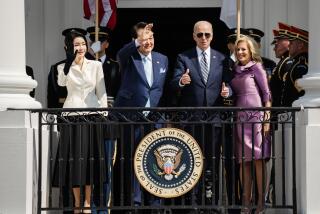S. Korea Leader Hopeful on Reunification : Diplomacy: Bush tells visitor from Seoul that the U.S. backs moves to make the two Koreas one.
- Share via
WASHINGTON — South Korean President Roh Tae Woo told President Bush on Tuesday that he hopes the two Koreas will be reunified by the year 2000, despite the current intransigence of the Communist regime in Pyongyang.
During a state visit here, Roh raised the prospect that the division of the Korean Peninsula, which dates back to the end of World War II, may come to an end relatively quickly. He called for “removing the legacies of the Cold War from the Korean Peninsula and Northeast Asia.”
Standing alongside Roh as he arrived at the White House, Bush voiced similar optimism. “Lasting peace will come to Korea only when Korea is made whole,” the President said. “And here, too, there is hope. . . . All Korea, north and south, should know that the United States stands ready to act in the interests of lasting peace.”
Underlying the new optimism are a number of signs that North Korea may be forced to ease its hard-line policies because of economic problems and a slackening in support from the Soviet Union and China.
Last month, North Korea announced that it would drop its longstanding opposition to having the two Koreas admitted separately to membership in the United Nations. North Korean President Kim Il Sung’s reluctant change in policy came after the Soviet Union and China apparently said they would refuse to block U.N. membership for South Korea.
A top aide to Roh acknowledged Tuesday that the current economic problems in recently unified Germany demonstrate that reunification of Korea will not be easy.
“If the same thing happens to Korea, it will be costly and painful,” Kim Chong Whi, Woo’s national security adviser, told a press briefing. Still, he said, the legacy of the fall of the Berlin Wall in 1989 shows that “once this (reunification) process starts, no one will be able to stop it.”
Despite their expressions of optimism about reunification, Bush and Roh spent considerable time talking about a more immediate concern: what to do about North Korea’s continuing efforts to develop nuclear weapons.
North Korea has built a series of nuclear facilities at Yongbyon, about 60 miles north of Pyongyang. The complex is said to include at least two nuclear reactors and a reprocessing plant to separate plutonium, a key ingredient in nuclear weapons, from spent nuclear fuel.
On Tuesday, both leaders put strong emphasis on the importance of having North Korea sign an agreement with the International Atomic Energy Agency and allow “safeguard” inspections of its nuclear facilities at Yongbyon and elsewhere.
Kim, the South Korean security adviser, said that if North Korea complies with international nuclear safeguards, South Korea would not object to more frequent and higher-level meetings between U.S. and North Korean officials. So far, American and North Korean diplomats have conducted 16 rounds of talks in Beijing.
Neither U.S. nor South Korean officials would say Tuesday whether the two heads of state discussed recent proposals to withdraw U.S. nuclear weapons from South Korea.
Recently, several retired U.S. officials and other foreign policy and military specialists have begun to argue that South Korea’s security no longer depends on the presence of American nuclear weapons. The Times reported last month that the Bush Administration has been examining whether it should pull U.S. nuclear weapons out of South Korea.
The official U.S. policy is neither to confirm nor deny the presence of nuclear weapons in South Korea. Asked Tuesday whether Bush and Roh talked about possible reductions in American nuclear deployments in the south, both U.S. and South Korean officials repeatedly cited this policy and refused to go beyond it.
Asked what specifically Bush and Roh plan to do to help persuade North Korea to permit inspections of its nuclear facilities, Assistant Secretary of State Richard Solomon replied: “In 40 minutes (of meetings), you are not going to cover all the issues.”
More to Read
Sign up for Essential California
The most important California stories and recommendations in your inbox every morning.
You may occasionally receive promotional content from the Los Angeles Times.










